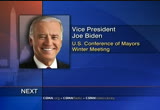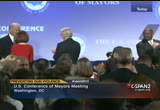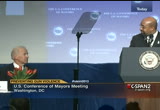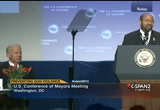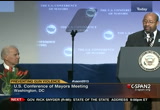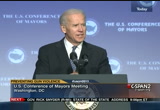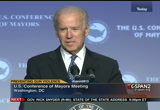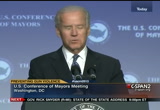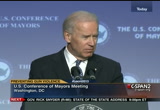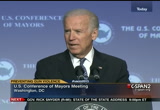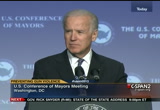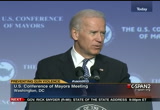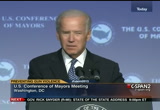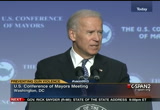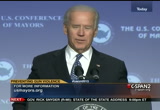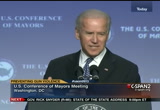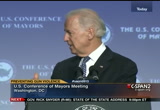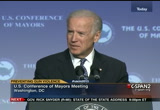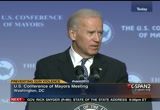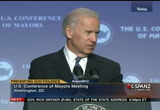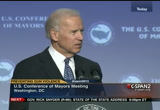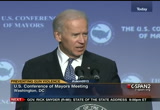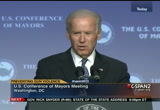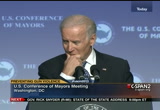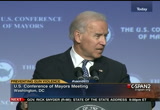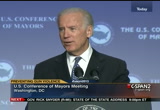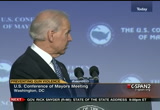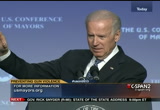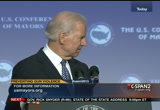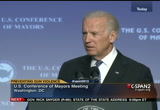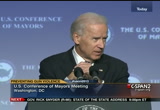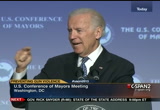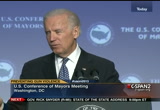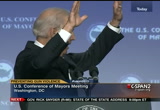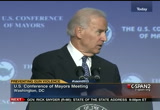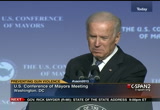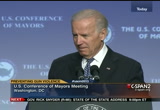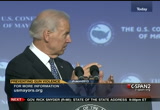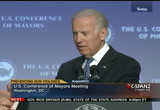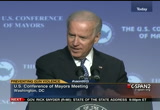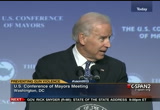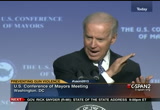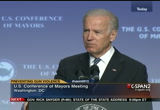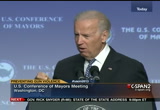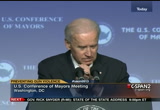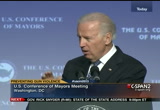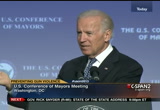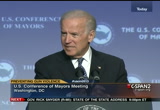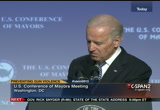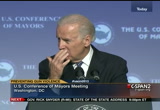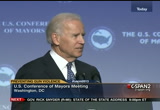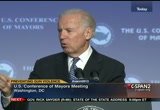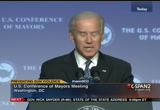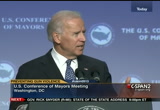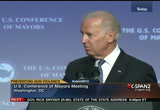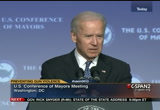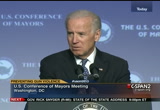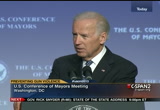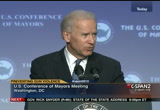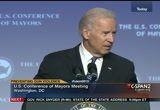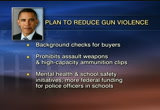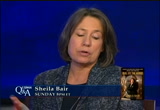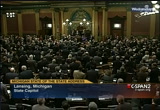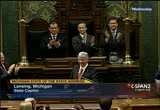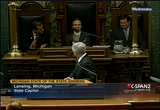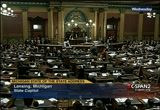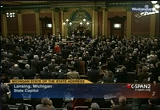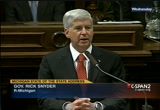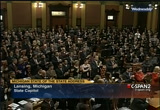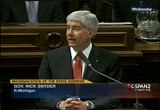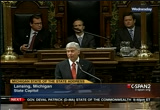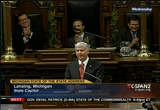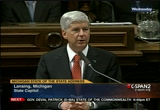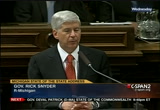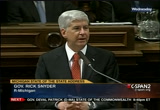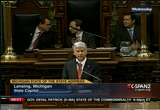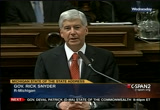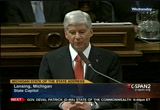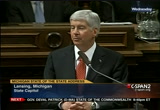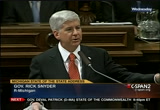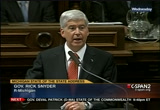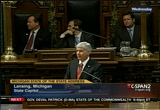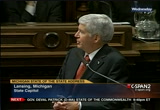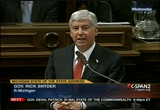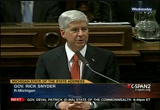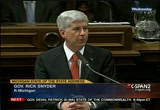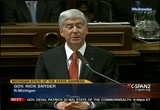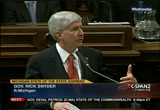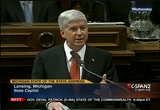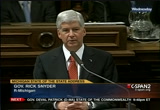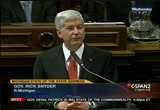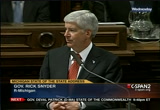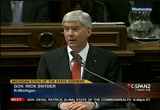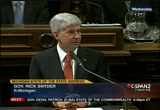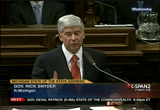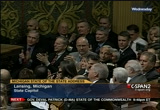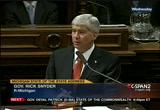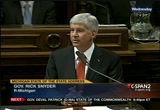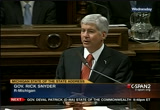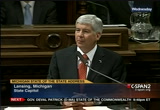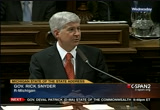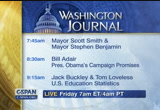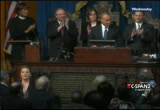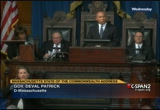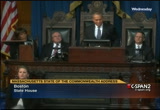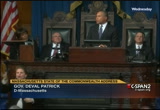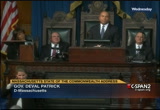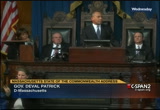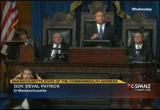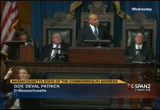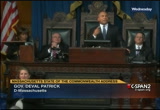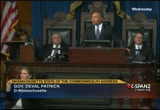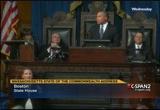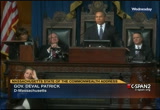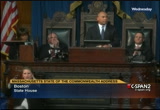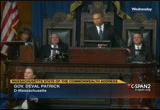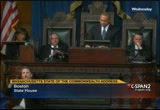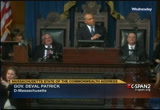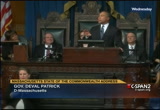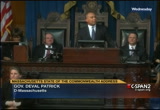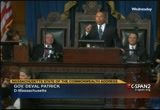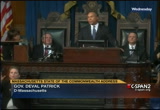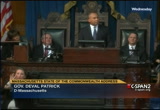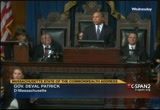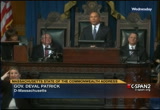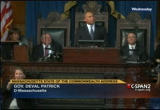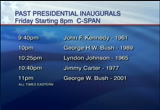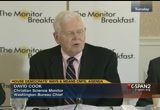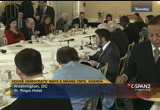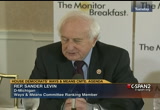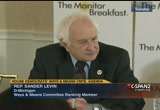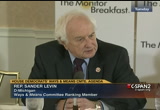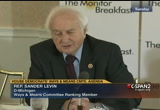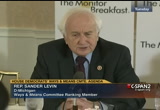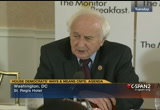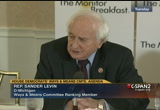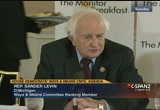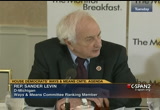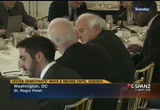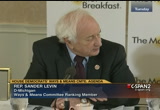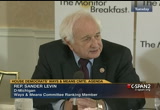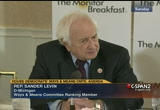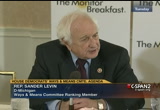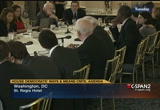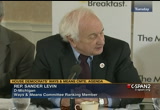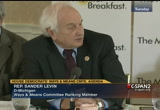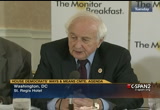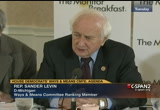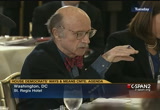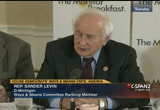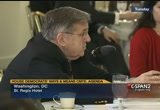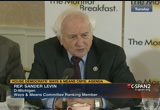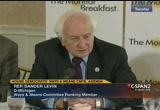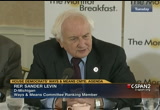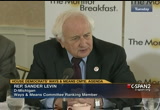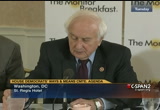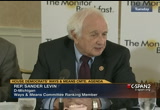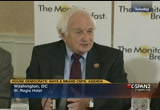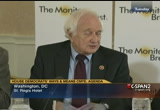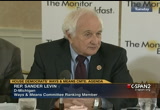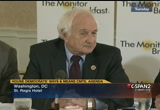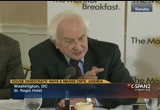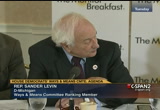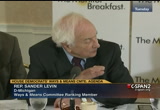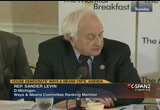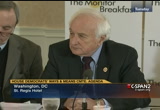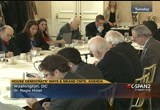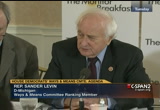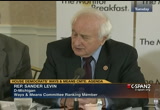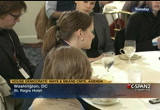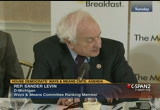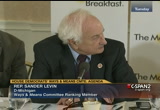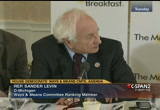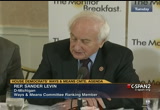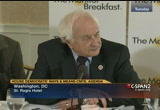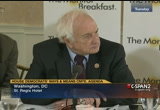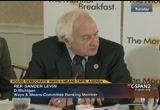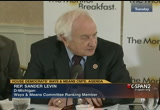tv Tonight From Washington CSPAN January 17, 2013 8:00pm-11:00pm EST
8:00 pm
the vice president described the thinking behind the plan which calls for background checkes, bans on assault weapons and high-capacity magazines, increase funning for local police and more research on gun violence. this is about an hour. >> ladies and gentlemen, please welcome the vice president of the united states, joe biden. and mayor michael nutter. [applause] [applause] [cheers and applause] [cheers and applause]
8:01 pm
[applause] >> mayors and ladies and gentlemen, it is, of course, my distinct honor and pleasure to have the opportunity to introduce our good friend, my good friend, vice president joe biden. throughout his career as a public servant, the vice president biden has championed issues that are critical to the prosperity and growth of america's cities and he has engaged directly with the u.s. conference of mayors on a regular basis. during our annual meeting this past june in orlando, vice president biden pledged the obama administration would make sure that the future
8:02 pm
infrastructure investments are more targeted to local areas. in november, last year, the vice president hosted our leadership in the white house, to discuss the fiscal cliff and the concerns of mayors regard boast inrestor programs programs progt financing. whenever there's major issue that demands attention, again and again and again, vice president joe biden has shown the leadership and courage needed to help move our nation in the right direction. that is why i was certainly very heartened when president obama asked vice president biden to lead a specific task force to develop responses to the tragedy at not only sandy hook elementary school, but the daily tragedies we see all across america. the nation's mayors and vice president biden have stood together for many, many years in support of public safety. after all, it was then-senator
8:03 pm
joe biden who championed the crime bill, which established the cops program, and included the ban on assault weapons and large-capacity magazines which congress unfortunately allowed to expire. yesterday i was certainly personally very proud to be in the white house, with president obama and vice president biden, unveiled a strong, comprehensive package, legislative, regulatory reform needed to responsible to the ongoing gun violence in america's cities and suburbs. every day, mayor's -- americas mayors see the carnage from assault weapons. we will make sure that the changes needed to protect our children are made. ladies and gentlemen of the u.s. conference of mayors, please join me in welcoming back our
8:04 pm
great friend, vice president joe biden. [applause] >> thank you very much. please. please. please be seated. thank you y'all very, very much. it's an honor to be back here. i like to begin by acknowledging two delwareans here that are very engaged in this subject as well. one, i've known for years and years, he is now our new mayor, dennis williams, dennis, don't know where you are but welcome to the conference, buddy. great to have you. and dennis and guy back to the days when we were writing the crime bill, when dennis was a police officer in the city of bloomington, and also the chief law enforcement of delware is here, who i've known even longer.
8:05 pm
we share the same last name. the attorney general, my son beau, and i do whatever he says because he has the power to indo it. -- the power to indict. all kidding aside, i'm proud of my home state, as we used to say in the senate, point of personal privilege, the progress they're making and thefts they're making under the leadership of our governor on the very subject you talked about. and i say to dennis williams, dennis, forgive me if occasionally i'm so used to referring to the mayor of philadelphia as my mayor, because i spend about half my life in philadelphia. and now that my granddaughter resides in the city limits i want to be particularly good. my daughter is also a voter there as well, so i've got to be particularly on good behavior. ladies and gentlemen, it's a pleasure to be back. i look forward to this opportunity every chance i get,
8:06 pm
from the time i was a young fella, new to the united states senate. it's one of the groups with whom i've had a relationship for a long, long time and always nice to be with a group of people who you agree with on 80% of the issues 90% of the time. so it's nice to be with you. i know you've come to talk about a broad range of very important challenging issues that is facing each of these cities and towns. energy, infrastructure, budgets, finances, crime, and i want you to know that we, the president and i, the important part of that is the president -- continues to be absolutely committed to do all we can to help the cities deal with the immense problems that get thrust upon them as a consequence of diminished tax bases and the consequence of housing, the
8:07 pm
significant portion of the public and their states that are in most need. we're committed to having a third phase of the so-called big deal on the budget. we're of the view that just as it took during the clinton administration, it didn't happen in one fell swoop to get our economy in great shape and move toward a balanced bump started off with three phases. started with president bush's actions, the first president bush, in terms of taxation, before president clinton took office. then the actions the president took in '94 and then in '97. well, we think there's a third phase here that can set our country on a path that will allow us to get our debt, the gdp, our deficit to gdp, down around 3%, which is the basis of
8:08 pm
which all economists left, right, center, agree, are the areas which we really can begin to grow as a country. and also my grandfather used to say, with the grace of god and good will of the neighbors, cooler heads will prevail between now and the time we deal with the debt ceiling, that we may very well be able to meet the goal which we set out to do, which is to have roughly a $4 trillion cut over ten years, and in the long-term deficit and put us on that path. but i didn't come here to talk about any of those important subjects today because, as important as they all are, today we have a more urgent and immediate call, and that is how to deal with the epidemic of gun violence in america. you all know the statistics very well so i'm not going to repeat them. on that score, i might add, oui an incredible debt of gratitude to many of you at the head table
8:09 pm
as well as those of you in the room. i know we don't have absolutely unanimity in this ballroom, nor do we in anyway ballroom, but we all know, everyone acknowledges, we have to do something. we have to act. i hope we're all agreed that there's a need to respond to the carnage on our streets and in our schools. i hope we all agree that mass shootings like the ones we witnessed in newton 34 days ago, cannot continue to be tolerated. that tragedy in all my years in public life i think that affected the public psyche in a way i've never seen before. the image of first graders, not only shot, but riddled with bullets. parents in the streets panicking, trying to find out if the child they put on the bus in the morning had any prospect of getting back on that bus and going home that afternoon.
8:10 pm
for 20 of those parents, the answer was, no. and i believe, as i'm sure you do, we have an obligation to respond intelligently and to that crisis. and i know many of you feel the same way. i've had the occasion to talk to a number of you, and i wanted to start by thanking all of you, including mayor bloomberg, who is not here today. i spoke to him on the phone. thank you for your input and your insight. again, not all agree on what should be done. but you have obviously probably more than any group of elect officials, thought about this issue more intently and longer. you've done great deal of work on this, all you've who deal with the issue every day. i'm not going to ask for a show of hands but i bed if i did a lot of people would put the hand up: how many of you mayors have had to attend the funeral of a
8:11 pm
police officer or an innocent child in a drive-by shooting or a shop owner in your city. many of you have had to attend, and some of you many, too many, such funerals. some of you represent communities that hear experienced mass shootings, not just in schools but in movie theaters and temples, and it's not unique to big cities and urban areas, as we now know. it was pure companiens dense i happened to be literally probably turn out to be a quarter mile ', back in 2006, at an outing, when i heard gunshots in thewoods that we didn't know -- we thought they were hunters. got back to the clubhouse and saw helicopters. it was a shooting that had just taken place in a small amish -- small -- small amie, school just
8:12 pm
outside of lancaster, pennsylvania. so it's not just big cities or well-to-do suburbs. it can happen anywhere. but i also know that it's not just about mass shootings. as my friend, michael, knows, and as my mayor, dennis williams knows, in wilmington, the murder rates in both of our up toes are wellor, well beyond, and some of yours are well beyond what is remotely tolerable for a civilized circumstance. it isn't just about mass shootings. it's about gun violence of all kinds. think of it this way. over the last several years, about 25 people die of gun-related homicides in this country every single day. every day. which is the equivalent of the third most deadly mass shooting in history. happening every 24 hours in this
8:13 pm
country. as much as we intend on making schools the focus, making them more secure, as mayor, i know imanuel of chicago, said most schools are safe. it's going to and from school when young people are in the greatest danger. but we don't see that on the news very much anymore. we hear about mass shootings. but not everyday gun violence that is ravaging our cities. i remember my friend -- really was my friend always looked up to him, always considerably senior to him in seniority, daniel patrick moynihan. and we were trying to get through the -- what was then called the biden crime bill, became the clinton bill, which you have all taken advantage of. we're on the floor debating this issue, anden daniel patrick moynihan stood up and said, as
8:14 pm
only he could, he told the story of the valentine's day massacre in 1929. and how it shocked the world when seven gangsters were gunned down in cold blood. it made the front page, according to daniel patrick moynihan, of every major paper in the nation and many around the world. then the looked up and said, but in 1992, when a woman saved her three-month-old baby from execution by hiding that baby under the bed, but she was shot and killed, along with her husband and her teenage son, that story -- and he took out "the new york times --" turned up on the second section, buried in the back of "the new york times." it wasn't front-page news. it was barely news at all. i'll never forget what he said. he said i call that defining
8:15 pm
deviancy down. defining deviancy down. how it wasn't even news. if that happened in 1929, it would have been astonishing. well, folks, we can no longer continue to define deviancy down. we can't wait any longer to take action. the time has come. as you know, this week i delivered a set of recommendations to the president -- to president obama on how we can better protect america from gun violence. i've been getting both credit and blame for that, as if these were original ideas of mine. i want to make it clear. what every deputy mayor knows, the only power and felonies the vice president has is reflective power. none of it matters. no matter what someone tries to
8:16 pm
give you credit for, we're -- we're not the leadership of the united states. this is the president of the united states. i am his agent. this is the president of the united states. and he asked me to good -- to go back because of my year of experience in judiciary commit year, asked me to go back and do as quick a survey as i could, as thorough as i could in a short time frame, and present him with a set of recommendations. i had the incredible helm -- help of some really first-rate cabinet meboses-starting with our attorney general, secretary of education, secretary of homeland security, secretary of health and human services, and we met with a range of 229 groups. representing a wide ranged perspective, from members of the law enforcement community,
8:17 pm
including many from your cities and states, to gun safety advocates, victims of the shootings, both down in virginia as well as out in colorado, sportsmens organization. hunters, gun owners, the nra. representatives of the video game and movie destroy. educators, retailers and public health officials. and as i said, i spoke to many of you in this room as well, along with the governors and the county executives. and no group was more consequential or instrumental in shaping of the document we put together for the president, than all of you in this room. to those conversations with you and other stakeholders, after literally hundreds of hours of work and research done by experts at the justice department and the department of homeland security and elsewhere, after reviewing just about every idea that had been written up, only to gather dust on the shelf, of some agency, in
8:18 pm
government, a set of principles emerged, that there was not universal agreement on, but overall whelming consensus on, and they were the foundation of the recommendations. if you'll permit me about another 10-12 minutes, i want to lay out to you what they are from the perspective of the president and me. the first foundational principle is, there is a second amendment. the president and i support the second amendment. and it comes with the right of law-abiding, responsible citizens to own guns. use it for their protection as well as for recreation. the second foundational principle, certain people in society should not, and legally can be disqualified from, being able to own a gun because they
8:19 pm
are unstable or they are dangerous. they are not the citizens that in fact the vast majority of gun owners x-ray. -- owners comprise. three, we should make commonsense judgments about keeping dangerous weapons off our streets. clearly within the purview of the government, at the same time recognizing, honoring, and being compliant with the second amendment. and four, this isn't just about guns. it's about the coarsening of our culture. the coarsening of our culture. whether it's the video games or movies or behavior, it's about the able to access mental health services, and the safety of our schools. it's a very complex problem, and
8:20 pm
requires a complex solution. based on these principles, and the input of a vast array of groups and experts, we put together a comprehensive plan based upon a commonsense approach, which i believe, from heading up this group, there really is overwhelming consensus there are disagreements in degree, but the consensus on the principles i've laid out. we asked a number of questions. and by the way, we recognize how different all our states and cities are. how different the gun culture is -- a healthy gun culture in rural america than in urban america. how different the gun culture is in states which are overwhelm -- my little state of delware, most of you probably don't realize, we have one of the highest per capita gun ownerships of hunters in america because of duck
8:21 pm
hunting and all these magnificent tributaries from the delware bay to the chesapeake bay, and she various rivers that flow into the bay. it's a paradise for hunters. it's a big business as well as an institutional -- it is cultural. i remember a woman named miss ann messing from delware. one reason i got elected. said, joey -- talk at me like that's, and dennis may remember. he said i want to show you something my daddy gave me. this is a woman who was 78 years old. she walked in the backyard and says you know, it is duck season right now. i mean, -- goose season. don't get mad. she walks into her den and takes a shotgun off over the fireplace -- this woman is almost 80 years old -- and walks out and she said, my daddy told me how to steady aim, and i won
8:22 pm
a lot. boom. now, if you did that in upper east side of manhattan, we got a problem. but it's really important, by the way, because some of you who share very strong feelings about gun control, i think it's important to understand it's part of the ethics for a lot of us -- where a lot of us come from. but it's not this culture. the recognition of the differences in the cultural behavior and attitude, from arizona to new jersey, although south jersey, it's a big deal, too, hunting. but my generic point here is, recognizing those differences doesn't in any way, negate the rational prospect of being able to come up with commonsense approaches how to deal with the myriad problems that relate to
8:23 pm
gun ownership. who has that gun? so we asked a number of questions. the first question we asked is: who should be prohibited and legally prohibited from owning a gun? current law has evolved over time. and we have -- we considered the question. my senior year in 1968, graduating, was an incredible year. bobby kennedy was assassinated, two days before i walk across the stage in graduation. dr. king, the guy who got me engaged in politics as dennis and others will tell you, was assassinated earlier in that year. even had the assassination attempt at george wallla. when i look back at '68, it's a wonder things held together, quite frankly. well, the congress passed what was then called the gun control act. and among other things it said
8:24 pm
that felons, fugitives, drug users, those who have been adjudicated and did not a politically correct phrase now but in the law -- those who have been adjudicated mentally defective, is what the law says, cannot lawfully own a gun. then in 1994, as the world exchanged the country changed, we added new category of people who were prohibited from purchasing guns, based on facts, not based of fiction, not based on presidents, and that is those who had a restaining -- restraining order issued against them in a domestic violence incident. that was a fight to get that enacted. then two years later we expand the list to anyone convicted of misdemeanor domestic violence crime because there was in history those are the most likely people to do something that would be untoward.
8:25 pm
time and experience has demonstrate we should continue to take a close look at the lists to see if it fits the needs of society at the moment. part of our recommendations to the president, i suggested that the president direct he attorney general to study that question, should any other people be added to the prohibitive category. for example, right now, certain convicted stalkers can still purchase gun. people with outstanding warrantses, as long as you don't cross the line into delware, they can get a gun. cross the line in dell e delware, it's a fugitive warrant. people convicted of misdemeanors for abusing their children are now prohibited, aid to the list. but you deal with it every day, there's parental abuse for elderly parents. should they be prohibited? i'm not making a judgment bota. convinced judgment but i am
8:26 pm
convinced whether or not the prohibited category should be scened. the most delicate area is the mental health area, which requires a great deal of study and ironically, this i is where you find the pro gun guys to prohibit more and the antigun guys saying, no, no, no it's privacy. but we have to look at it. we have to address it. just a few of the potential categories the president asked the attorney general to look at. but there's a second issue involved here, and all of you know it. we have a thing called nicks. it runs the background check on people before they can buy guns if they're in that prohibited class, and it's a little like, if you ever bought a gun -- i have two shotguns, 20-gauge and a 12-gauge shotgun. you go and you get a background check. and it's a little bit like
8:27 pm
swiping your credit card. but when you check out with your credit card, if the bank doesn't have on record exactly what you have in that account or not in an account, then you got a problem. well, it's only as good as the information available. that ncs. and right now the information being put into that national system is woefully incomplete. states are supposed to make mental health record available for people who can't have guns. for example -- but today, there are 17 states that have made fewer than 10 -- ten, t-e-n -- ten mental health records available in the background check system. ten. there are tens of thousands of felons, the estimate is, who are convicted in your cities and state, and that information never transmitted to the ncs
8:28 pm
system. so we recommended to the president that he redirect, because no one knows for sure whether or not it's an ideological judgment governors are making not sending the material, or is it an economic issue? so, we asked the president to redirect $20 million to the states to help them update those records and make them available. he decided the justice department should do just that. but money only goes so far. a lot has to do with leadership. again i apologize for being parochial. i'll always be a delware guy. i'm proud of our state, and because of the leadership from the governor delware has moved from one of the worst performing states to one of the best performing states as a consequence, at least as rated
8:29 pm
by the mayors against gun violence. it's about leadership, making the decision to make this available. i know you folks have a lot of influence in your states. well, that's not quite true. i have a bad habit of being straightforward, so the truth is, not nearly as much influence you should have in your states. not bus of you but the way states work. but all kidding aside, i ask you to continue to push, push your legislators, push the governors to make these records available. again, i'm not suggesting there's any nefarious reason why it's not being done, but it's not dump it's not done. and i'd also ask you to think about whether or not we should consider making the record-sharing mandatory, as a matter of law, or do you think the idea that i proposed to the president of incentivizing states to provide the information is enough? we'd like to hear from you on
8:30 pm
that. one of the thing's learn is that the federal government hasn't been doing a very good job in the last ten year either, about sharing information available. so, on the recommendation, the president will issue an executive order that everybody got all up in arms about, like he was going to rewrite the constitution, he directed every federal agency to make sure we, the federal government, live up to our end of the bargain to share all relevant information within the lawful possession of the federal government to that system if it contained people who should be disqualified as a matter of law. but you need a system that identifies people who shoot not --...
8:31 pm
we can't say with absolute certainty what i'm about to say is correct. the can insist is about 40% of the people who buy guns today, do so outside the background check system. right now, if someone purchases a come from a licensed dealer, he's required to undergo a background check which takes a matter of minutes. did he convey the exact same kind from a private seller with no background check at all. that is change.
8:32 pm
think about it. it's like an airport. imagine you get to the airport of the two lines for security. one of them you have to go through the metal detector, take off your shoes on the other when it goes straight through to the plane. where are you going to go? especially if you are carrying something you're not supposed to. which line you think the terrorists pics? well, same thing about gun sales. why would a criminal by a con at a store where he's required to do a background check already gun show from a licensed dealer, but he's required to go to the background check. when he can buy a gun from the guy who sometimes has assigned about saying no background check required. i won't get into detail why that's the case because it's the definition of what constitutes a gun seller, not only for profit,
8:33 pm
but how frequently you engage. we will go through that. so why would we do everything in our power to stop that? these rights infringed on? a lawful citizen, the guy who has nothing to hide or woman who has nothing to hide goes to the sister. virtually no complaints. even with an incomplete system, there's almost 2 million convicted felons adjudicated, mentally incompetent and the rest of the categories they're just mentioned tonight the ability to legally buy a gun. so it makes no sense to me, especially since when i wrote the original assault weapons ban, there is a 12 day waiting period and 96 day waiting period and then the nra said something i agreed with. they said that, we went and checked if you can do this quickly. so invest a lot of time, money and effort in setting up the system. and by the way, i'm going to
8:34 pm
sell you my 12 gauge shotgun among mr. mayor in my home. it's not a big deal. now we take another 20 minutes to go to sporting goods. we pay them $10 to $12 it's done. it is an inconvenience, but it's not an inconvenience is to the potential hole it may plug in the system. and we can make exceptions if they want to leave my guns to my sons, both are nice ideas and better than i. that's because he's the nature of the army. my son hunter is better, too. we may write exceptions into handing down guns, giving guns to family members. there's no reason why we can significantly broadness to try to pick up that pool of roughly 40% of the people who buy a gun without any background check.
8:35 pm
the third question we ask is what kinds of guns should be kept off our streets? some will say wait a minute, take any gun you want off the street, not true. another say you have no right to take anything off the street because as jefferson said, history of liberty is the blood of picchu tucson. you hear it all the time. augusta? no one knows you're able to tell someone, even if you're a billionaire, you can't go by an m1 tank with ordinance. you can't have a flame thrower appeared so it has been established, there is the ability to have legitimate limitations on the type of weapon that can be purchased. toward that end, we look at two
8:36 pm
issues. the definition of assault weapon and high-capacity magazines. the president believes -- the president believes that there should be, and i grew with them, and assault weapons ban. i know have been written a assault weapons and that the industry would do whatever it can to get around the can not figure out a way. what can i find you can find the start, scope, do a lot of things, but it can get around. i also know we have to try to believe we have to try. but i also know as assault rifles aren't the only kind of gun that can accommodate high-capacity magazine. some of your deer hunters, they're hunters, taking hunters. i'm not being facetious. i'm been literal. most used and not endeavor can take clips that accommodate 30, 40, 50.
8:37 pm
you don't, that they can accommodate. so we recognize the weapon of choice in your town also is not a rifle. the weapon of choice in the vast majority of people killed with a handgun. but you can put him off a lot of rounds in the block. and a lot of other handgun weapon. so we are calling for the prohibition of high-capacity magazines altogether. we can argue whether or not we are right at 10 or 12 or seven or nine or 15. we know it makes no sense like we've learned since columbine and aurora cam newton. you are an incredible jobs. i'm not being solicitous. local officials have been incredible jobs and reducing the response by your police officers to crises. but high-capacity magazines
8:38 pm
leave the dems had no chance at all to often leave police outgunned as well. and aurora the assailant had a 100 clip magazine. now how does that but not jammed, got us how many more people would have been killed. i met with gabby giffords's has been coming here in its own right the other dan pointed out to me, you know this better than i do, when gabby was shot, but for the fact when the assailant had to put in a new clip and fumbled and a woman reached out and jumped grabbed him, prevented him from putting a new clip in. a new congressman who is injured and shot properly three would not have been around to tell the
8:39 pm
story. so, some of those children were read out with 11 bulletholes. high-capacity magazines in our view are not worth the risk. [applause] high-capacity magazines don't have a practical sporting purpose or hunting purpose is one hunter told me if you got 12 pounds, it means diverting regarding this figure 11 times. you should pack a factor in. you don't deserve to have a gun. if you're that bad. last night seriously, think about it. you're here, does this say looking for sporting a gun
8:40 pm
ranges. i don't know why we can't say those weapons should be kept at the range if that's what they're for. make that judgment without in any way impact their sporting enjoyment. the next question is how do we make our streets and schools safer with regard to our streets, i believe in the president believes that cops make a difference. remember when i first wrote the cops bill. we never tried that before. [applause] i should be clapping for you while because they're passing you made it work. you make me policing work. crime and violent crime went down because if you come in the way you employ this additional police officers. that's why it went down. that's why it happened.
8:41 pm
and we still think, particularly this economic difficult times for you and municipalities want to provide state and local governments have the resources they need to keep cops on the street, even during hard economic times. [applause] push by the way, some of these smiled when mike said, and joe is going to make sure these programs go directly to the cities. i tried that with the recovery act and it didn't work, but i tried with cops and networks. [applause] that's how it should work. but here's the deal. if you don't think you should find yourself having to cut funding for law enforcement in order to pay for some other essential service, we thank you agree festival come back at it again and they've gone through omb. we're going to push again for
8:42 pm
another $4 billion in grants for the cops program. [applause] is important. here's the deal. thank you. i do want anybody confusing not with the argument that in every school in america should have armed guards unarmed teachers in print both in the lake. in the original cops bill, as they rode it, as we wrote it, there is a provision for school resource officers. i admit to you when i bought it the first time, i wasn't thinking of mass shootings. but i was thinking that is the same principles as community policing. the reason why community policing work proceed at your local law enforcement officers acquainted with and accommodated in the neighborhood where they build trust. and so mrs. jones in the corner who is watching a drug deal go down every night in seeing
8:43 pm
shootings and having her window was not a couple times, she's not going to pick up the phone and call city hall. she's afraid. but if she's got a relationship with a local cop, she'll say charlie, but its value is happening on the corner. the same thing happened with school resource officers because what happens is they stand in a school, armed or unarmed, uniformed. and guess what? kids get to know them and they think it's cool and it's like talking to your coach. what we found out, kids say things like john, when i open my locker this morning, three lockers down, 47, there is a handler that guns sticking out. john, don't say anything, but there's a drug deal didn't go down in the back of the gym today. john, there's going to be a
8:44 pm
rumble. here's that were going to do. we think, we believe school resource officers can play an important role, but you should have significantly more flexibility in how to use them. that's why proposing a new school safety program that funds officers, but also tastier communities the flexibility to apply for other support. so the school resource officer is going to cost two x thousands of dollars a year with the money the federal government is pretty not. you can say we'd rather have a school psychologist for my school resource officer who was unarmed. but what we don't want, the president and i., we don't want to rent a cops in schools armed. we don't want people in schools who are trained at police officers. we are not even insisting schools use police officers if they conclude they need a school
8:45 pm
psychiatrist versus a school resource officer, you can apply for the funding that would otherwise come for that purpose. we also make sure every school has a reliable emergency response plan. i know i'm preaching to the choir when i say you have no idea school districts from across the country that is picked up the phone and called my office and said, can you tell us that the best plan is to something like this happens? the department of education has been inundated. one of the few things the federal government historically can do well, since we have our resources, and this figure out what best practices are they going on the country taking information from you all come in deciding the practices are insane and going out and say look, congress has funded creation of these plans, school districts you want to take advantage, here they are.
8:46 pm
we are asking the congress to fund safety implementation programs. the next question we asked was how, improve access to get the help they need before it's too late. we look at circumstances and people at hf medicaid. you've got these kids get mental health services. all of a sudden they age out and there's nothing there. there's nothing they can do, the social worker, a social worker like my daughter, who worked the state, now works for a nonprofit. all of a sudden, what are we going to do? this kid still needs help. he's aged out. we are calling on congress to help those who chose children every day to look for the warning signs to refer kids to treatment. it turns out three quarters of all mental illness appears to
8:47 pm
age 24, the less than half the children at diagnosable mental health problems ever receive any treatment. we need to change that. the practice say we are already positioned, better than ever in the history of the country to make progress because of the affordable care act to fully kicks in next year. [applause] and because of the leadership of republican senator domenici and democratic senator ted kennedy on mental health parity. we've got to get this nation to the point and that's what we're going to speak to a second, where in fact a mental health problem receives the same credibility and coverage with a physician or psychiatrist if someone breaks their arm. by the way, parenthetically, as my son who is in iraq veteran can tell you he's had to do with this, without a lot of women in an coming home with invisible
8:48 pm
injuries. we have over 40,000 visible injuries. over 19,000 will require half the rest of their lives. my wife and i spent all last night at walter reid meeting with the only good news is the number of amputees on the floor now is down, spending the whole night with these kids who are double amputees, some triple amputees. but there's another category of people. we don't other number, but we notice significant which are not brain injury, the invisible disease, the invisible room with posttraumatic stress. there's a lot of veterans coming home, suicide rate is astounding .
8:49 pm
there's not sufficient mental health capacity in the system memory doing everything to hire 78,000 votes in pa and the like, but the plaintiffs didn't have to to deal with this answer the question we asked was how to do that and that's going to take more time, but we think how to begin this process. the next question we asked was how do we prevent the vein of the existence of seven of the biggest cities in america and a lot of other people starts with the obvious proposition , creating a federal drug -- excuse me, a federal trafficking statute for guns. we have one for drugs, but there is no governance tests. as you point out how substantial bands are committed with weapons purchased outside your state or city.
8:50 pm
illinois, the guns recovered at crime scenes are purchased outside the state. in new york, 68%. the only way to stop this is a federal trafficking statute. we recommend to the president take on congress to pass a statute to be a great of those are proud by people who pass the required background checks that buy weapons for others. maybe they give them to a middleman who transports them from florida and new york for one state to another, but there isn't an explicit path against purchasing. says straw purchasers than others trafficking guns are often not of the prosecuted patcher per paperwork and the only ways to make a paperwork violation. you know as well as i do how many guns are unaccounted for because they were straw purchase. we need strong federal laws.
8:51 pm
and finally, i know i've taken a lot of time, but this is something so many of you has spent a lot of time talking to me about. we ask, what can we do better about understanding gun violence? some of you know when the crime delay of 3094 expired and the assault weapons ban in 2004, one of the scenes we were able to back then in 94 was right legislation the latter is to he can hit a gold mine of information. the cdc, the center for disease control is able to conduct gun violence so they can configure basic things about causes and uses. not only did the congress not only result, it also pose significant impediments on
8:52 pm
federal agencies doing basic research and explicitly prohibited. the cdc is prohibited by federal law from doing any research. there's a whole set of amendments added that further constrain the ability to gather data. we need answers to a lot of questions. when it is your understanding of the causes. what a longer-term independent studies to determine not only the impact of guns and how people die and what type of guns and so on and so forth. we need studies, and this is for the entertainment industry doesn't like me at all. we need studies on what are the impacts on young minds witnessing repetitive violent acts either movies or television or video.
8:53 pm
[applause] that's not an indictment of the industry. the recognition we have no expensive modern studies on these things. it's worth pointing out from my conversations with these industries, they seem intent on doing that they can do to help. they've got a rating system and other chores at the vast majorities of americans don't even know. if you have infinity, you can have your grandchild or child watching this early-morning cartoons on saturday that have excessive violence. you can program your television to take out extreme violence, moderate silent. you can do it now. 90% of the parents i don't think have any ideas. they should be going on a major advertising campaign to the people now. quite frankly we don't have sufficient data and it seems to me as an informed society we need data. so the president sign a
8:54 pm
directive that allows the cdc to gather information again and i think that's a very important step. let me conclude by saying once again, thank you. thank you for only did to contribute to the report, the thank you for the opportunity to come and be as explicit and hopefully not boring and laying out to you the elements of what we believe we have to look out. let me acknowledge the truth, that too many in this country have been silent too long. [applause] we cannot be silent any longer. those beautiful children who lost their lives are no longer able to speak for themselves. we had to speak for them. i never people who lost their lives in the city streets of your cities to gun violence since newton 33 days ago, for
8:55 pm
now i guess it is, are not able to speak for themselves. we've got to speak for them. within 9000 lives lost to gun violence in our city each year are no longer able to speak for themselves. there are some who say the most powerful voice and those who demand this out to these commonsense approaches to save lives. i think they are wrong. this time. this time will not be like the the times that have come before. newton has shocked the nation. the carnage on our streets is no longer able to be ignored. we are going to take this fight to the halls of congress. we are going to take it beyond that. we're going to stick it to the american people. we're going to guard the country country making our case and let
8:56 pm
the voices of the american people be heard. the movie critic i've -- and we will be criticized because of not spending enough money on immigration, fiscal situation. look, folks, presidents don't get to choose what they do with. they do with what is before them and what they like to long term. all these things in a relay. i want since former mayor daley of chicago back in the early 90s, if there's anything i could do for you, what you do? he said get rid of the drug problem. it would transform the economy of a city overnight. gun violence follows in a similar category. if we speak for those we lost and we speak for children and families, with the courage to do what we know is the right thing
8:57 pm
to do, then we'll have the most powerful voice and we come to you, citizens will change the nation. i've been in this site a long time. i have no illusions about the fight in front of us. i have no illusions about distortions that come from all sides. but i know full well the political obstacles thrown up against us are not impenetrable. i have no illusions about how hard it's going to be, but i know this, we have no choice. we will not be what took her kids and grandkids in the eye if we don't use every energy, every fiber in our being to try to keep them safer. will not be worthy of the generation that's going to grow up now about this 20 innocent kids and thousands of people are at a loss. will not go to stop every act of senseless gun violence or any
8:58 pm
other violence in the future, but that's no excuse to do nothing. that is not an excuse to do nothing. as the president has said, if we can save even one life, it's worth it. i believe together we can say will hold lot more lives than not and they think we can begin again, not because of guns allowed, but we can begin an endeavor that stops the coursing of american culture and society. i think we can begin to turn this around. it is not all because of guns. it's a lot of other things. maybe would have been a newton is a call to action about more than just gun violence, about civility in our society. you are on the front lines, make a list you and may god bless the memory of the victims of newton and all those others who have fallen as a consequence of this senseless violence.
8:59 pm
thank you for your time. [applause] [applause] >> thank you all very much. [applause] >> in president obama's proposals he recommends background checks for all gun buyers. a ban on assault weapons and high-capacity clips in federal funds for police officers in schools. these require congressional approval.
9:00 pm
9:01 pm
i did have a site that is important for the historic record to present our event also currently for people to understand their different policy choices, different options, disagreements and if we want to prevent this crisis, and other crisis from happening again, i thought the public itself needed to engage more in financial reform, take a bigger interest can educate themselves can make it an issue with elected officials. they treat her to make the book accessible an exit policy recommendations at the end i hope people will look at and take seriously. >> michigan governor, rick snyder called on lawmakers to look at his plan to raise a billion dollars to rebuild roads.
9:02 pm
9:03 pm
9:04 pm
please be seated. thank you for that warm welcome. it's great to be with you tonight. once a year redo the state of the state. it's a moment to stop and pause. it's a moment to stop and reflect on how we can use relentless positive action to continue reinvention of michigan. tonight but i hope to do is talk about the dashboard, where we stand, to talk about 2012, to talk about 2013 and to talk about our future. it's a great opportunity. i'm happy we could share it together. first i want to thank the people that made this possible. says speaker bolger, thank you. [applause] my partner, lieutenant governor brian calley.
9:05 pm
[applause] senate majority leader richardville. [applause] there's three good-looking guys they don't have to look at the back of me for one year. i also want to stay thank you and welcome to senate minority leader whitmer. [applause] house minority leader greimel. [applause] i want to welcome members of the supreme court. [applause] secretary of state, ruth johnston. [applause] attorney general, bill schuette.
9:06 pm
[applause] all the members of my cabinet. [applause] i want to thank all the ladies and gentleman of the legislature. thank you for your partnership. [applause] i want to thank the citizens of michigan for this opportunity. it's an honor being your governor. [applause] and then i have a special thank you. i would request that every member of the military service or armed services stand. [applause] [applause]
9:07 pm
they deserve a special thank you. i would like to share a couple moments with you. in april last year, i made a trip. in many trip to to kuwait and afghanistan and on that trip was the most moving trip of my entire life. her specialties to the service to find people give our country. one special thing happened among many that i would share with you showed me how proud i am to be a michigander. i was at forward operating base in afghanistan and is it the 125th and should treat, and michigan national guard unit. when i arrived, they asked me to do a real blessing ceremony. thread the opportunity to serve people in to the list of united states military and the michigan national guard in a forward operating base in harms way. those are special people and we need to stay thank you to anyone
9:08 pm
serving. to give you some there, we had well over 1000 michigander servant come back this last year. we currently have over 650 michigan person serving our country around the world today and there is a cost and we need to understand that. this last year we last name service people that were michiganders, including kyla mccain, a national guard's person. i think it is only fitting we send our thoughts and prayers to anyone in the armed services in all their families. if you would join me in a pond of applause from those wonderful people serving. [applause] [applause] thank you.
9:09 pm
the final group or want to thank her sitting up front and they came in with me is my family. it's a wonderful opportunity to get all the kids dressed up. but thank you, family for putting up with me. [applause] now to the speech. and you know me, i do this to my first day of the state, talk about a dashboard. measures and metrics on how we're doing. i'll try to do this fairly quickly into the documentation in terms of all the dashboard i've been using since the day i took office, but tonight in terms of this talk, i want to share five different items that you in terms of different metrics to show how michigan is doing. the first one is how's the economy? for the six fastest growing city in the nation. we should be proud of that. [applause]
9:10 pm
and just to talk about the major industries, everybody talks about the victory autos. i call it our bakery industries, auto, agriculture. i went to the auto show this week. he had a mistress back in our country. over 14 million units sold, the one you may not know right here in michigan, the spicer reproduced over 2.25 million units of those 14 million units assembled right here in michigan and we should be proud of that. [applause] and the good part is where the best of those units are due at the north america not a show or so the press already, the winners of car and truck of the year, the cadillac ats and the ram 1500 assembled. if you want the best, you buy it a michigan product.
9:11 pm
[applause] agriculture continues to do well. we had a challenging year. we freeze earlier near the devastated some of our fruit crops and i was terrible. where drought issues, but overall we had record production and sugar beets and wheat for example in one thing i want to mention back in 2011 i work the farm or agricultural community and setting goals and one of those goals was to say there were $71 billion of output for the michigan economy. we said a 2015 goals to get to 100 landholders of output by 2015. i am proud to say this last year, we had $92 billion. so my request, where's wayne would come he's up there. we need to take that number. where's sandbagging. that number better be more than $100 billion. [applause] tourism did very well. over half a billion dollars
9:12 pm
increase. when i browse share. since gsm phone with the very best we've had enough visitors in terms of hotel occupancy in hotel room rates. so they are coming back on tourism in michigan, too. this is the place to be. so the economy is doing well. income levels doing on our state. if you look at the rate of income growth in our state, with a nine in terms of per capita income. that's a great number. if you look at employment, private sector employment since our point to 2009 we've added 177,000 jobs were going to keep going. [applause] the home market is coming back here besought nearly 10% increase in home sales. over a 5% increase in prices for homes. that's a critical industry and we're the comeback path they are. the last thing in terms of
9:13 pm
metrics, not a normal dashboard measure, but his importuned. for me to the census in 2010, only one state in the united states on backwards, plus population. i'm proud to say the faster we didn't go by much, but michigan is a growing state again and population. [cheers and applause] [applause] is just a starting point. our goal is to continue to make sure we keep our young people in the state will continue to work hard and what we've done is not good enough, but let's keep moving forward. with respect to 2012. it was a busy year as we all know who the three areas that will break down and talk about our jobs, people and good government. on the jobs front, what do we do in terms of making things that make a difference, three major
9:14 pm
tax reforms have made michigan a much more competitive place to many to stay stay focused on that. the first is personal property tax reform on the industrial front and low-volume businesses is a great achievement and framework and we need to continue work in that issue because one thing i want us to do is make sure we support our local partners. i encourage everyone in august 2014 to make sharia the yes vote on proposition to keep their revenue ran for local jurisdictions. good work on personal tax reform. it's going to keep as this is coming to michigan. [applause] to other tax items i want to mention. one is great progress in terms of severance tax reforms, something we need to michigan. a huge issue for the upper peninsula should be part of the outcome. we have a dozen potential mining products either in processor on the drawing board and the tax
9:15 pm
change will help encourage them to come to michigan, bring jobs to the upper payment to help michiganders across the state. good work. [applause] unemployment tax reform. we did that. we exited a bond issue to get excited over the federal government. i want to give treasury to lend credit for the bondi or in the entire united states. but it's going to end up doing is saving employers over a billion dollars of the next seven years, which allow them to create more and better jobs for citizens. good work. [applause] regulatory reform. we did give birth or through the office of reinvention and the work of this body working together. if you thought, we eliminated over a thousand worlds last
9:16 pm
year, roughly eliminated 10 rules for a vendor will be added. that's how you create an environment conducive to business also protecting citizens that will generate jobs. good work again. [applause] infrastructure, huge projects going on better on a beginning and i'll be talking about for the next two years i hope because of their progress. the first dimension with a smile as the bridge. [applause] we are moving forward with the new international train crossing. were written on the presidential permit, but it's a great opportunity and went to bed partners in canada that would not be possible. in particular senate to counsel general graham norton on a personal level, but also the country of canada for paying for this bridge. there's no taxpayer dollars involved. [applause]
9:17 pm
a huge accomplishment of something better than 40 years in the making, this is success have been known as the regional transit authority for southeastern michigan was a great effort of people working together in our teaching and not for all that hard work. [applause] i do have one particular announcement on that front. in announcing tonight to share. i get one appointment as the chair of the rta and for the great group i couldn't think of anyone better than the person who will serve as chair eyes paul said to. step two hillegonds. many of you upon his track record is fabulous and on the legislative side and want to give a shout out to senator tom casperson in making his great work at the rta have been a lot
9:18 pm
with other great transportation. [applause] favorite portable line. a yooper transit to detroit. one other thing, to mention that wasn't done by this body, but was really what i want to acknowledge is a great achievement they are just starting, but will be critically important and exciting, a project in grand rapids. they will put the rapids back in grand rapids and make it a recreational pastry can go kayaking and do other great things. what you think the people of the grand rapids area for that great hard work. [applause] also on the jobs front, i want to mention a program that many people don't know about in this group are most of our citizens, to michigan business cannot come nida dispute is common sense i worked hard to believe make it
9:19 pm
happen. but the concept? it's not about the government spending money. fast and michiganders to do more business with michiganders. matchmaking and getting people signed up. how's that for a great concept? what works. we started it last year. a couple years ago actually. but progress has been tremendous and started in terms of purchasing by with utilities with consumers on the landing site with two banks, huntington and fifth third. since 2010, in 20 11 and 20 told, over $800 million for purchasing dynasty to michigan another based on and has almost $2 billion of loans made in the last two years because of these programs and is going well that exciting but it is spread yesterday to announce the ford and chrysler are also joining the program. let's keep this going, get michiganders buying more from michiganders because that's our jobs.
9:20 pm
[applause] now let me turn to the people front, which is critically important that we don't talk enough about that. because we people in need in our state would need to do more to reach out to giving great service. one program i'm tremendously excited about, gets me excited talking about a code path we potential. i give credit to the department of human services mark corrigan -- maura corrigan. let's get people out of the government office. whoever doing is getting social workers, getting an success coaches and asked them to leave the government office and go work on a local public elementary school. we're already doing that 21 schools that are foremost in the cities of the highest crime and challenges. by april -- by february this year, will have over 135 schools
9:21 pm
will have success coaches and. that is what government should be about. it's not about sitting at a government office waiting for your customer to come to you. it's going to the customer, serving them in their neighborhood, understanding issues, taking better care, showing success and i'm happy to share one success story with you and i would ask as they stand as success coach, dana trafelet has her son joshua. if you could all stand out. [applause] grade every year. thank you for joining us. and to quickly tell you the story, dana was put in a school and on the first day of school, one of yolanda's children came and from one of her daughters came in and flip flops and dana had a chance to talk to her and
9:22 pm
learned about yolanda and her family situation. he was living in a homeless shelter. dana worked with them. we got them into rental housing. joshua was having challenges in school and if you look at it, joshua needed help on that front. yolanda is currently working part time now and looking purse or ged hopefully i'm a full-time job and joshua is doing well enough from school. from what i understand he won most improved in math and attend ends. [applause] they had come from the south when i was say to them is thank you for coming to michigan and welcome to michigan. thank you are sharing your story. thank you. [applause]
9:23 pm
say great success. another great successes or summer youth initiative in terms of putting young people to work in some of our most challenge communities. this lacerated over 750 k. and in terms of that, it's been wonderful, it's about public-private partnerships. many community organizations participate in this want to recognize one of the people. i could have done many, but in terms of that person, i ask anton stinson-winters to stand up. you are right over there, too. [applause] there he is. [applause] so anton stinson-winters is actually very shy person from one of his soul. but i appreciate you standing up because he is a success story. and thomas in the east side of the story, going to macomb community college, but you didn't ask about bowling and it
9:24 pm
went through this program you great exposure to many other wonderful things in and thomas now to the point resupplied for position with the dnr and the can another opportunity to miss is the kind of success story and i appreciate you won an award for outstanding performance in perfect attendance in this program. so congratulations for your hard work. it pays off at four tcd be story in michigan. thank you. [applause] one other area where nature meant a success last year was with autism. that was something very moving to mean. if you look, we have at least 15,000 young people better qualified candidates to get assistance and we have evidence-based treatments that can materially improve quality of their life to allow them to have a great family life can't be successful. it's wonderful. if you think, there are no losers. it helps society in terms of
9:25 pm
being more successful than they really appreciate so many people here who reached out to make legislation have been. in particular, three people here don't want to recognize senator rebekah warren. i want to work in a leader randy richardville who took up this costume is very very first days in legislature and lieutenant governor brian calley for teamwork in making this happen. thank you. [applause] one other area we did them proud of his healthy kids dental, about giving kids do need better dental coverage and that makes a huge difference. we now have over 440,000 people in michigan this program come young people, but a long way to go. i'm proud to say we're adding another another 97,000 this is a programmer should continue until we get all kids in michigan covered in some fashion. the thank you for adding those
9:26 pm
extra 90,000 kids. it will make a difference in their lives. [applause] good government. there's a topic that you know i get focused on as an old cpa. one editorial comment is weary of romano. i wish washington d.c. would follow will be created at the basics we do here. so if you talk to someone in d.c. county should tell them to look to michigan. we do things right. [applause] and to give her a couple illustrations have appeared back in 2010 when i took office he looked at the fund and that was the balance in the rainy day fund? $2 million, then the government for 30 minutes. the current balances in excess of $500 million. that is success.
9:27 pm
[applause] another huge win for sun retirement reform in two ways. the first race be materially reduced liabilities commit future liabilities of our citizens by over $21 billion. that equates to $2200 for every man, woman and child in the state of michigan in terms of those real savings that will accrue to their benefit that they otherwise would've had to pay. [applause] the second piece of it though as it is important that people in this retirement programs can count on having retirement dollars show up when they retire. we had not been responsible in terms of state government. we have been responsible now, so i'm proud to say and stand up for future retirees that were going to work hard can it
9:28 pm
continue in this path and you'll have a funded system or you can count on that retirement check when you do retire. [applause] a couple other items is employee empowerment. we worked hard and getting state employees were fired up enacted in the process and not to credit the lieutenant governor and coming up with something called bureaucracy buster's. basically an apartment what they could go online and submit ideas. we have a 10,000 state employees participate, put in over a thousand ideas, over 100,000 those that we are implementing a number of key ideas in recognizing the winners and we are going to keep the program going. it's really cool, getting excited employees. this is not been cut in the bureaucracy. this is saving the customer, our citizens. [applause]
9:29 pm
and then i want to recognize some thing often overlooked as we probably had the largest quarry formed potential in the history the united states have been right here in michigan and was in large part due to your work in legislature, but in particular want to thank chief justice bob young and the supreme court and the entire judiciary for their involvement in this process much hyped about performance measures for quartz, core consolidation and it talked about concurrent jurisdiction. in that fine work is going to continue. i want to compliment the courts and its work and other colleagues in and us in leadership in the country on these topics. so thank you. [applause] 2012 was an all cheerful. at the end of the year with a difficult time. that's unfortunate and i wish it wouldn't have happened. sometimes it does happen in this world and what i would say to
9:30 pm
all of you is i hope we can work together. i hope we can work to avoid this kind of situation that would've the most things we do is we can have policy differences. we can have different perspectives, but ultimately we are hired by the citizens and people in the state of michigan and our role, responsibility is to give them great customer service and to give them the best customer service is not join our differences, different perspectives and those kinds of issues. it is stepping up to say, how do we work together with respect to make sure we do the best job possible? i appreciate people have different perspectives and what i'm saying is i'm going to work hard to find common ground where we were together i hope all of you join me in doing the same thing. [applause]
9:31 pm
9:32 pm
want to move ahead in asking in good partnership to say let's do something to put more resources in to our roads and redo our road distribution formula. both end of the equation. the sources coming in and how we use the dollars. the tough question is if you goat the question of we need more dollars for roads. what it means. well, again, you know i'm a cpa, i believe it's a package program to save us money. this is not about costing us money. this is about saving us money. and build forking the future. so let me walk through the steps. if you look at it, we need to invest at the state level 1.12 billion more a year. i also want to provide far local option for an additional couple of hurpd million dollars of additional revenue. they are user fees. let's be blunt. they are user few fees. it's about user fee increases to
9:33 pm
pay for it. the numbers, if you stop to look to say it's an annual amount of roughly a billion dollars. where would we be in ten years with it and without it? we're putting -- that's $10 billion. i can go the math. we have donl analysis to say what will the bill be if we didn't spend the billion year. that's in the range of $25 billion. $25 billion. so this is just like looking at question of do you get oil changes on regular basis? do you pay for that or wait for engine rebuild. by investing that money it will save us more than $15 billion in the next ten years. that's huge. that's the first step. it only gets better. what is the next thing that would happen? one of the problems and one of the reasons we see the citizens upset besides getting additional
9:34 pm
dental bills they have additional car repair bills. so what we if is looked at the average car repair expense in michigan compared to the four surrounding states. on average, we spend $81 more for vehicle than the surrounding states do. that billion dollars i said we would need to equates to about $120 a year per vehicle. that varies depending on your usage how much you drive and the value you vehicle. there's $80 offset right there. waiting with there's more. if we invest that billion dollars a year it will create over 12,000 jobs in michigan. that's a lot of jobs, folks. that helps a economy a lot. the last one is, there's no price to put on this, i wanted to ask you a question. how many people know anemia lost their live in a car accident? raise your hand.
9:35 pm
talk about it for a second. i bet most of us do. if we cothis we have done work to say we would save nearly a hundred live a year. a hundred lives a year each year. there's no price you can put on that. so if you step back and look at this, it's an opportunity to say,let just do the right thing. and invest in our roads, keep our citizens safer, create jobs, and have save a lot of money and not stick our kids with a big bill. so encourage people to work hard on this. i want to give a shoutout to the senator khan who stepped up to be a leader on the issue. i encourage other legislators to step forward in join him in moving this forward. [applause] in terms of another piece just down the road thing, one piece of legislation i'm asking for is
9:36 pm
automated vehicle registration in terms of saying they're coming up with antonymous vehicle today. google and other places that have vehicles nay not have people in it. i'm not suggesting it now. don't get nervous. california, florida, and nevada passed legislation on antonymous vehicles. they're ahead of us and aren't we the automotive capital of the world? i think we should be stepping it up here and make sure we're on the forefront of advancing in vehicle and fund. i encourage that legislation. [applause] now i'm going talk about something that talking about schools and kids, but i have -- you can put it under jobs or people. the point of getting great education is having a great career and being successful. to give you one illustration there. one of the things we have we have a situation we're not getting enough performance out
9:37 pm
of our educational system. only 17% of our kids are college ready. that's absolutely unacceptable. over 60% of our kids have to take a remedial class when they go community college. that's absolutely unaccept public. and the toughest places we have schools that are persistently failing schools. about two years ago we came up with a innovative format to cancel with the failing schools that can be a forum. a place to talk about innovation and education. and really show student growth? we did. and those schools opened this last accept. -- september. it's educational achievement authority. there's are fifteen schools in the area. it's not detroit-only project. it should help things across the entire state of be michigan. we took fifteen schools amongst the most failing and put them in to a system of schools to put the most resources possible in the classroom.
9:38 pm
to have a longer school day, have a longer school year. they have three meals a day. but even more importantly, they have a student-centered learning model where the students are driving their own educational growth. and eaa there's no such thing as failing a grade. there's only a question of how long it takes you to master a level. and i think that's a very important opportunity for people to look at. and it is working. i'm proud to say the gates foundation gave us one of the breakthrough awards for innovation in education. it's going well. what i would ask you to cois pass legislation we talked about the later part of last year but come visit the school. tonight i'm opening an invitation to every legislator to visit the eaa and talk to the kids. i'm happy to say we have a couple of people from brenda scott elementary middle school. let me see which direction they
9:39 pm
gave me. we have the principal, and we have roberts joining us in the gallery. [applause] now in terms of them, i want to share a little bit, if it's okay, he was a challenged student in terms of both behavior and performance in the classroom. he got in to the eaa. he has gotten very engaged. he's in level 13 and 14. i asked the kids what grade they're in. they said we're not in grades. we're in levels. i appreciate that. he's done well from a challenged beginning in november he was student in the month. and on a path to being actually a mentor for younger students in the school. and go for it!
9:40 pm
you have my support. [applause] we're looking for good success. on budget-related items. i'm not going in budget details. these are things we will have in the budget that we think should be a priority for attention. the first one and the great start early childhood area. we have 29,000 students better eligible for a program to get them to preschool. i don't believe we can accomplish all of that. i'm open to coming up with creative ideas to get there. i think it's important we make a major budget commitment to get as many kids in as possible and get us on a path goating the kids and great start in early childhood program. i ask your support for that. the second thing, on a skill trade training side, there's opportunityings there for us to go better. there are open jobs in michigan we're not filling. on the topic i look forward to
9:41 pm
working several representatives on that. thank you for signing up to help be part of the team to get things done there. [applause] glmpleght the u.s. conference of mayors is meeting this week in washington and on tomorrow's washington journal we'll with talk with two mayors. republican scott smith of mesa, arizona. and stephen benjamin from south carolina. and how president obama is disliferring on campaign promises. and discuss how -- our guests of and tom of the brookings institution. washington journal is live every day on c-span at 7:00 a.m.
9:42 pm
eastern. next massachusetts governor delivers his state of the commonwealth address. in the remarks he talks about investing in education, innovation and infrastructure pay for the transportation plan and education improvements. this is thirty five minutes. [applause] thank you very much. thank you, everyone. thank you. [applause] thank you. thank you very much. [applause] thank you very much. [applause] thank you.
9:43 pm
my friends -- [applause] thank you so much. to lieutenant governor murray, fellow institutional officers and members of the governor's council, miami president and members of the senate, mr. speaker and members of the house, members of the honorable court, members of the congressional delegation, municipal and other elected officials, members of the cabinet and administration, reverend clergy and most especially fellow citizens of mts. good evening and happy new year. please join me in welcoming our extraordinary first lady, diane patrick. [applause]
9:44 pm
diane, thank you your unsung service and for putting up with me. are before i begin, i want to ask us all to pause and reflect quietly on the necessary sacrifice of our men and women in uniform here and abroad, and the unnecessary sacrifice of those poor first graders in newtown, connecticut, and all of those lost to gun violence in our own neighborhoods here at home. thank you. i spent some time yesterday at the or charred gardens school in roxbury. i talk about this school before. whenever i visit or a charred gardens or any of the many extraordinary schools in the commonwealth, i wonder whether
9:45 pm
public in service people should make such visits a daily requirement. the energy, the optimism, the hopefulness provide fuel and focus for our work. yesterday, i listens -- listened to second graders and middle coolers read essay on what i want to be when i grow up. engineers and firefighters to work in clean tech and go law school. an unimaginingly poised second grader told me her dream was to be a teacher. every one of them is thinking about college. i was the first person in my family to go to college, as i know is true of many of you here. i grew up with grandpas who were educate as far as a third grade and a mother who dropped out of high school. my big break came through a citizenship to milton academy when i was 1. and while, thankfully, no one ever told me college was not for me, milton was the first
9:46 pm
environment i was ever in where college was a normal expectations. i applied to five colleges back then. when the letter arrived saying i was admitted to one i wanted, i called home with the news and my grandmother answered the phone. i'm going college, i'm going harvard. she started yelling and screaming, so excited and so proud. and then she paused and she asked, where is that anyway? [laughter] i was totally deflated. but gradually i came to realize that that it was not the press teeing my grandmother was excited about. it was the opportunity. it was the chance. that's all that mattered. that's what always matters. maybe especially here. for pilgrims seeking to worship freely, for slaves seeking freedom, for immigrants seeking a better way, for your mothers,
9:47 pm
fathers, grandmothers and grandfathers seeking a tow tow hold in the middle class. massachusetts has a lafned opportunity. everybody in this chamber gets that. in many, many encounters i've had over the last six years, with members of the legislature, whatever your politics, you are your most joyful when you bring a third grade class or a high school championship team in for a meeting or picture. you respond to just as i do. you see they are craving for opportunities. and you know that opportunity is at the core of the american dream itself. from good jobs to good schools to good communities. creating opportunity is at the center of our best work. opportunity is too important to
9:48 pm
leave too chance. opportunity requires growth and growth requires investment. it's just as true as government as in my business, the economy is not like the weather. not some natural force that is beyond our control. something we have to wait for others to predict or explain it to me. what we choose to do and not do shapes our future. indeed there's one friend of my likes to say the future belongs to those who prepare for it. that is why we invest in education. innovation, and infrastructure. we invest in education because well prepared young minds and mid career talented is our global calling card and our economic edge. we invest in innovation because the work force likes ours enabling and encouraging new ideas is the best way to take
9:49 pm
advantage of the knowledge explosion happening in the world economy today. we invest in infrastructure because rebuilding our roads, rails, bridges, expanding broadband to every community, building new classrooms and labs and more affordable housing gives private initiative and personal ambition the platform of growth. education, innovation, infrastructure. it's a strategy priewfnl through history and is working for us today. that's why we leave the nation in economic competitivive ng. in entrepreneurism. bio tech and veteran services and energy efficient. that's why the state structure deficit is gone and why we have achieved the highest credit ratings in our history. that's why with further still go we have emerged from recession faster that only state and stronger than we were before.
9:50 pm
to prepare for the future we invest in ourselves. and we have done so during the worst economic downturn in living memory. largely by reshaping government by reforming the transportation bureaucracy and shutting down the turn pipe. we have together save the commonwealth over $11 billion so far. which in turn has enabled us to invest in education, innovation, and infrastructure and to grow
9:51 pm
opportunity. there is always more to do. only this past week we proposed to reform the retiree health benefit plan and consolidate 240 local housing authority. with the help of business and advocacy group we are systemically coming through state regulation modern ising what remains. we proposed to eliminate unnecessary and due politictive fees on business. to close loopholes in the unemployment insurance system and strengthen the oversight of the compounding pharmacy industry. only this warning we refiled several gun safety measures to help stop tragedies like newtown where the recent shooting of 13-year-old boy in roxbury on the way to choir practice. there's more to do. the friewt is that in any successful organization, public or private, the work of
9:52 pm
self-government -- excuse me self-improvement is never finished. i am proud of the fact that working with a house and senate no administration has ever delivered more sweeping reform of state government than ours has. [applause] we have our new proposals, there are many others before you now. let's continue this work together. but as important as reforms are and will continue to be, they are not enough. if we want to accelerate growth and expand opportunity throughout the commonwealth, we have to invest more now. hear me clearly. government is no substitute for the private sector.
9:53 pm
nothing can replace private initiative and personal ambition, business, not government creates jobs. but government has a role to play in helping our citizens help themselvessings. that's why we invest. and why investing in education and infrastructure, together through government is so important to generating private sector growth. but in our schools and transportation, there is unfinished work. after twenty years of education reform, our students are at the top of nation in student achievement and at the top of the world in math and science. teachers have more support and flexibility to respond to student's individual needs and standards and accountability are high. but achievement gaps persist. and they will until we go deeper. every educator knows that
9:54 pm
reading sufficiency by the third grade determines academics. achievement gaps begin to form in the early years. today in massachusetts only 61% of all third graders are proficient in english language arts. for african-american 38%. hispanic 38%. toddlers, ingrant -- infants, other precoolers, 30,000 of them are on the wait list for early education opportunities. let's ensure that every child in massachusetts has access to high quality early education. [applause] we know from educators, academic research and from our own experience as parents that
9:55 pm
investing in our children at the young age pays huge dividends for them and for our community as a whole. let once again fund k-12 education higher than we did last year. our lead in education is too important to lose. our competitors state, competitor countries are not slowing down. neither should we. and as we do,let focus resources where poverty is too often concentrated and ensure that every middle school child in every gateway city has a longer school day. filled with enrichment programs, service learning, art, exercise and music. andlet do more to make a college education affordable. look at those students at the or charred garden school thinking about where they want to go. you can hardly contain the promise and potential in the room. why would we want to? somewhere in that room or rooms
9:56 pm
like it, is a fern who is going to cure cancer or take us to mars or invent the next ipad. somewhere in that room or one like is it the nurse who is going to care for us, the craftsman who is going rebuild the skyline of our city, the musician who is going to draw thousands to concerts. the teacher like little adrian ya wants to be who inspires another child. we have made great, great strides in higher education. and i'm especially proud of our community college reforms last year. now let's take the next step by raising our investment in public college and university and reinvigorating the mass citizenship program. [applause] >> we have unmet needs in our transportation system too.
9:57 pm
everybody knows it. let's give our citizens 21st century transportation for a minute. imagine it. imagine if you can depend on a bus or subway that came on time, safe and comfortable and ran until the student or worker finished up at 1:00 or 2:00 in the morning. imagine if with young innovator could get a fast -- family in new bedford had access to the work and social opportunity here in boston. imagine if the green line ran all the way to metaphor and the commuter rail ran to springfield. and the line was open between pittsburgh and new york. imagine if you could drive at highway speeds the whole length of the pike and let technology collect your toll? imagine that the interchanges on
9:58 pm
128 were you didn't have to add 45 minutes to the rush shower commute to get through the bottle neck. our citizens do not want less transportation. they want more. they do not want us to spend more on the same old thing. or just move money around from one idea to the next. they want us to invest in a disciplined and strategic way in the things that improve, quality of their lives and grow their opportunities. this past monday, the department of transportation showed us how. what we need to properly operate the system we have, and to add those few additional prompts that unlock growth and opportunity in long neglected part of the country. ask education the transportation plan shows specific needs we all
9:59 pm
knew were -- and just as in education meeting those needs demands new revenue. now there is no good time to raise taxes. this is the point i knew this speech where silence would fall over. [laughter] i know just as clearly as possible how tough the times have been on the people and families of our commonwealth. and though the worse of the recession is over, many, many families still face tough decisions and have deep anxiety about the future. i would not ask if i did not believe in my heart that investing today in education and transportation will significantly improve our economic tomorrows.
10:00 pm
because we all have a stake in that future. we should all contribute to pay. [applause] for me -- [applause] for me any new revenue must meet three key principles. first, it must be comprehensive. we have to pay the bills, we have accrued already over decades. we have to finings and modernize what is broken and old, and we have to invest in ways that unlock our economic potential in transportation we can no longer tell whole regions of the state like the south coast or western to wait to share in the state's prosperity. [applause] and in education [applause] in education we can no longer
10:01 pm
keep choosing some fourth graders over other fourth graders to get their chance to succeed. [applause] so first comprehensive. second, in transportation in particular new funding must be dedicated. we need discipline, sustained investments, and specific service improvements and expansion project over time without the risk that funds will be divert to the next good idea. and we need to be able to show the people of massachusetts their money is targeting specific results. third, the source of new revenue must remain competitive. right now our overall tax rates are comparable to the states which we compete. we need to sustain that balance and assure a sharing of the load
10:02 pm
within the commonwealth that is fair. with those principles in mind, i propose to restructure our tax system by placing a greater reliance on the income tax and less reliance on the sales tax. [applause] in my budget, in my budget i will propose that we cut the sales tax from the current rate of 6.25% to 4.5% and dedicate all of the proceeds to a public works fund. that fund will support the transportation plan i have laid out both our existing responsibility and the necessary expansion project. as well as the school building fund, and other public infrastructure. under my plan, sales tax proceeds would be off limits for any other purpose.
10:03 pm
to support our education initiative, my budget will propose that we increase the income tax by 1 percentage point to 6 % 25% to make that increase fair to all according to their ability to pay. i will propose that we double the personal exemptions for every taxpayer, and eliminate a number of itemized dedeductions. making those changes gives us a tax code that is simpler and fairer. let me add that with these changes are sales, income, and business taxes will be comparable to and other states in the region beyond with which we compete. this is whatly propose. there will be a debate. i encourage it. every one of us here has to think twice before asking people who already feel strapped to
10:04 pm
contribute. but this time instead of sinking to the same old slogan. let's have a serious respectful, and fact-based debate. the people we work for want what what i have described. they want the rail and road services we have laid out. an above all, they want the opportunity and growth these investments will bring. we, on their behalf, have choices to make. i choose growth. there is a accustom that every governor hangs a portrait over the fireplace in the governor's office. i choose the portrait governor john andrews who came to office before the civil war and gave three black men the -- free black men the opportunity to
10:05 pm
serve the country as soldiers. it was not a popular thing for him to do or legislators then to support. it showed political courage and that act ever courage meant something to those men, to future generations, to the nation as a whole. i'm rounding the turn on the last two years i will sit in that office. ly trouble you only once more with this annual call to action. as i consider our work over the last six years, i think most governors must wonder when they round this term, what will last? i submit to you that if we act in this bold way, if we redmoit support our schools, and our highways and biways and do it for every corner of our common place, not only will we have done something meaningful for
10:06 pm
today, but we will have a affirmed our commitment to opportunity i.t. i look forward to working with you. thank you all. god bless you. god bless the commonwealth of massachusetts. [applause] they preview the upcoming debt ceiling debate in congress. vice president joe biden speaks before the annual conference of mayors. that's followed by michigan governor rick snyder who delivers the state of the state address. and later massachusetts governor deval patrick delivers the state of the commonwealth. friday attorney general eric holder speaks before the u.s. conference of mayor's annual meeting. he's expected to -- new gun laws
10:07 pm
proposed by president obama. live coverage starting at 1130. >> friday night on c-span. we'll show you inauguration speeches from the last sixty years. starting at 8:00 p.m. eastern with president ronald reagan's address from 1981. bill clinton from 1993, president eisenhower in 1957, at 9:00 p.m. harry truman from 1949. richard nixon from 1969, and president john f kennedy in 1961. george h. w. bush in 1989. lyndon johnson in 1965. from 1977 jimmy carter and wrap up with george w. bush's speech from 2001. see ten inauguration speeches from ten past presidents. starting at 8:00 p.m. on
10:08 pm
c-span. requiring congress to act intestified working around the legislative body. speaking at the briefings hosted by the christian science monitor. he said he's hopeful not confident about the perspective for a tax reform. and expressed a willing tons look at the medicare eligibility age in the context of deficit reduction. this is an hour. >> thank you for coming. welcome to our first breakfast of the new year. our guest is sander levin of michigan. this is the first visit with the group. we welcome him. he's a detroit native learned bachelor of degree in chicago. elected michigan state senate. he was assistant administrator
10:09 pm
to agency for international development. he was elected to the house in 1982. four years after his brother karl elected to the senate. in march 2010, he won the gavel as chairman of the means committee. thus ended biographical portion of the program. now to the thrilling process portion. we reason out record. no live blogging tweeting no filing any of kind while the breakfast is underway. there's no em bow gar when the breakfast is over. they have agreed to not use this for at least two hours after the breakfast ends. if you happen to be sitting near a mic. pull it close if not they'll come around. if you would like to ask a question, do the dray -- traditional thing. i'll do my best to call on one and all. well give him a chance for comments first.
10:10 pm
>> thank you for joining me. i was thinking yesterday as i was listening to the president about past conflicts over deficit reduction. mark and i were talking about how far back we go to few years. and i remembered some of the earlier deficit reduction battles we had. i voted for virtually all of them. and i was thinking what is changed since those debates? and i think there have been two major changes. number one the deficit is clearly much greater, and that's
10:11 pm
an added dimension. but secondly, the -- when i think of the ways & means committee, what a change there's been in the competition. when i joined ways & means, barbara had just left the ranking member, and he then went the world bank. i worked with bill frenzel on trade. bill archer was handling the tax material, mainly and bill was working on health care. i think a second major change that effects the debate is changing composition of the republican party. i think it has moved very much more to the right describe it from the days when i joined the
10:12 pm
committee. and i think that makes it very much more difficult to handle the problems that we have before us. so let me just comment briefly on where we are. you heard the president yesterday. we've had spending cuts of a billion and a half or trillion and a half. it comes from the budget control act and the 2-11 appropriations. we've had a trillion and a half of spending cuts. in addition, as we all know, we passed not so long ago the tax bill, which essentially in terms of deficit reduction adds over 600 billion to it. as the president described, if you take in to account interest,
10:13 pm
we've essentially had deficit reduction of $2.5 trillion. the president set a goal of an additional $1 trillion deficit reduction, if we're going essentially stablize the debt, say it's 73%, of gdp, we are going have to, in the next period of time, be have a deficit reduction of about $1.4 trillion. for me, that is the goal that we should set. so the argument we're having in addition to what the deficit -- let me just give you my point of
10:14 pm
view. the president yesterday talked about having balance, and i think for us democrats that's the key. there has to be a mixture of spending cuts and further revenue. and we need that balance for three reasons. number one, in order promote economic growth. in my judgment, if all of it comes from cuts and programs, that will not accelerate economic growth. the second reason relates to income inequality. there's been a startling change in the last twenty years, really. the middle class is essentially been staggered. in the figure really is in 2010,
10:15 pm
93% of income growth went to the top 1%. in the third reason remits to -- relates to discretionary spending. i was looking at the ten-year projection for discretionary spending, and for the domestic part of it, if we continue on this path in terms of rate of gdp, domestic discretionary spending will be under 2%. it will essentially be cut close half in this next decade. and so we're talking about education programs, we're talking about health programs including nih research. we're talking about infrastructure. we're talking about key domestic discretionary programs that are so important for the lives of
10:16 pm
the vast majority of -- so let me just say two things about that. number one, there has to be a balance. number two, i think it's vital as the president said so clearly yesterday, that the debt ceiling essentially was must not be used as a weapon that essentially takes on and essentially un-- undoes the basic full faith and credit of the united states of america. the president made so clear what would be at stake if that were to happen. and i just think it's so critical that that not occur. you know, i've been through
10:17 pm
these battles as i said for many decades. but i don't remember anyone essentially saying that we should go over the cliff in terms of the full faith and credit of the united states. the consequences would be, i think dramatic. i think potentially cataclysmic. for the republicans who essentially saylet do it, i think that would be a very, very serious mistake with foreseeable consequences. the federal reserve said don't do it, i think the response of the position is we should not flirt with it. >> [inaudible] start asking you questions. so you've said it's cataclysmic, shouldn't. be done in term of reaching the
10:18 pm
debt ceiling. both sides seem locked in -- the president said i'm not going talk about the debt ceiling. speaker boehner said it can't be done unless we cut spending at the same time. so having watched this for more than thirty years of congress, what are the outside of actually avoiding going over the cliff given where both parties are? >> i think the odds are that we won't do it. [inaudible] as a mart of faith and consequence. those who say let's toy with it. they are toying with the american economy and they are toying with the global economy. and so i think it's somewhat -- it seems great to talk about doing that. but the closer you get to that cliff, i think the less likely
10:19 pm
it is that you'll -- [inaudible] >> let me ask one more and go to rick. let me ask about tax reform. you told "politico" last week that a balanced approach to replacing the sequester was spending cut and revenue. should accelerate tax reform. i believe it's fully possible this year if we work on a bipartisan basis. unquote. how does that square with the people that say tax reform is going to lose out because of scheduling need to deal with the debt screaming and the -- ceiling and the sequesters. house republicans concerned if they do anything about tax reform. they may leave it open to the senate and not taking action and taken the vote for no reason. are you optimistic? >> first of all, i have -- we have to reself the debt crisis in terms of sequestration. and in term of the full, faith, and credit in the next six
10:20 pm
weeks. we aren't going to accomplish tax reform in the next six weeks. so we have a deadline that i think cannot be basically moved for what we need to do in the next six weeks. that will leave us adequate time to tackling the longer range problems. we're not going tackle tax reform in the next six weeks. we need to essentially deal with the sequestration, specially find a balanced approach that is going to raise a trillion dollars or close to. so that's why i have some optimism because we need to face up to the next six weeks, resolve it, and -- [inaudible] >> rick.
10:21 pm
[inaudible] by conflict -- i want to ask you about one of the big things the intiement element reform. how big would you need see in term of public -- [inaudible] take the debt ceiling off the table for the next reform years. would it be big enough? what do you need see for you and your colleagues on the democratic side to say, we're going engage in the conversation to the other side missing on entitlement? >> first of all, i have to take the debt ceiling off the table for a considerable period of time. secondly, regarding entitlement reform, let's take medicare, there are two challenges in term of medicare in the future. number one, is the rate of
10:22 pm
health care growth has been diminished. and the rate of medicare cost increased that has also been -- [inaudible] that's the first consequence or the first event of the last three years. secondly, we have health care reform, which has accelerated in health care cost increase. whattic we need to do in terms of medicare is for both parties and both house and the white house to sit down and have a serious discussion about how we continue to get ahold of medicare and other health care costs. we really need do that. our social security we have to have the same kind of discussion and so i'm urging the chairman of our committee the ranking
10:23 pm
member in the senate, myself, and the white house or others to sit down look at medicare, look at health care reform look at the increase and see how we intensify that. i was among those who urged health care reform that we put in to health care reform instrumentality to change from a fee-for-service system. fee-for-service is not a freezable structure for the present and future. we have the instrumentality, i think to exchange it for a different system. we need do that. does that answer your question? [inaudible] >> part of the fiscal policy.
10:24 pm
the debt ceiling over sequestration, over even the resolution. and be part of the minicrisis or the big crisis we're facing in the next several weeks. >> my own judgment is that we need to face up to sequestration. we need to find a balance way to do it. and then go on to tax reform and entitlement reform. >> bryan? >> [inaudible] it gets back to the first question for mr. kline where we are. and to my comments about the
10:25 pm
change in the republican race. i think the president had no choice but to essentially say to the republican party, you should not dabble the debt ceiling. it's something with such serious consequences. i don't want to find ways around it. those really ways that are very problematic. essentially what we have to do is to face up to the need to address the sequestration and then move on. and i don't want you to use as a weapon the debt ceiling because it's not a weapon against me, it's a weapon against the full faith and credit of the u.s. and therefore it's essentially a
10:26 pm
weapon against the citizens of the country. our economy, and the global economy. and i think he needed to be straight up and not say that the essentially what i'll do is look for ways around it. the republican caucus has, as i said ate the beginning, so dramatically changed from when i joined -- which has jurisdiction . the republican party has to decide how much it's willing to game, the economy of the united states. [inaudible]
10:27 pm
i'm not surprised. [inaudible] negotiations that resolved in a fairly -- [inaudible] have an effect on the regulatory regime, both in this country and europe. going in to that, what your reservation -- [inaudible] the deal that would emerge from the negotiations. what would you be most concerned about? >> i said in a meeting of the group that is looking at this, in my position, stated there was that we should undertake serious discussions between the u.s. and
10:28 pm
e.u. at the same time, i think we need to be realistic. i was -- [inaudible] what was that? over ten years ago, and i think there were unnecessarily optimistic views about how quickly it could be done and uncomplicated it was. it turned out that caution was better part of judgment. i think they would have to be willing essentially to open up the markets and not use various procedures to try to safeguard their market. so i favor proceedings, but with
10:29 pm
an understanding that there are immense issues to be looked at. and it's not going happen very, very quickly. i'm in favor of starting it. [inaudible] it's fancy language for -- regulations. whether allow european -- to you see opportunities to streamline the way the two economies governor themselves? >> it's the latter. let me put it this way.
10:30 pm
we have dealt with the issues regarding safeguards, safeguards and others with ore countries. we did that in negotiation with colombia. we did that in negotiations with panama. if any two entities resolve those issues, it's the e.u. and united states. essentially what the e.u. has been doing, in my judgment, is to use their regulatory provisions too. i don't like the word protect, exactly, it's overused. to essentially safeguard their market for our competition. so we ought to be able to do that, if any two structures should be able to meet those tasks. that, i think, is very doable. i mean, the french will have to
10:31 pm
be willing to let us enter in to their market. you know we had the same problem with the russia pntr, i think we have basically taken the step to resolve it. if we can do it with russia, we can do it with the e.u. -- [inaudible] the democrats have dishainged. isn't this -- when you were in the majority party. certainly when you came to the house, and even most recently. and so it all in one side the
10:32 pm
change? >> the market isn't all one side. but, you know, i looked over the roster of ways & means when i entered in the next two years. i did that yesterday. and there's been a change in the composition both democrats and republicans. and i regret what has happened, i think redistricting has really very much diminished competition in the '90s i was in a margin and had four contested elections. a few of us were talking yesterday about some of the ads we ran in those contested elections. they were difficult. i think we need more of them. mark, let many be very clear about my feeling. there has been some change in the republican -- democratic race but compared to the
10:33 pm
republican race, i think there has been considerably less change. i regret that there aren't more within our ranks. but i think the main obstacle to resolving the debt ceiling crisis and moving on is, are the tensions within the republican conference to some exat the present--ings tent and the senate on republican side. i said this with some caution, there has been in a sense a radicalization of the republican conference in the house. and i think that the results of that were shown in the difficulty that the speaker had in the last few weeks. ..
10:34 pm
10:35 pm
we were out of kilter. now, just closing with this. i urge everybody to look at what's happened to income growth in this country in the last 30 years. i represent a district that is very, basically blue collar. they now change it because of redistricting so now there's a higher income iningredient. i represent mostly comb county. it was reagan democrat, as it was called, territory, maybe the first, and i think if you talk to people within the county and parts of oakland, what they essentially will say is that for the last 10, 15, 20 years, the middle class of this country has essentially been treading water while there's been a tipping of
10:36 pm
the balance in favor of higher income groups, and i think they would agree with what cbo said that that tipping has not been promotional of economic growth. we remain on the democratic said, though the ranks have somewhat changed, with the mainstream of the country. i think the republican conference is out of step. i think it's gone too far from the ranks of the ways and means republicans when i first joined that committee. >> we're going next to john mcken nan, author, steven cooper, to end. >> can you talk a little more about tax reform and entitlement reform, how the process will unfold, will they be linked?
10:37 pm
is there going to be a target in mind for the deficit reduction that might be involved and talk about how that process works. >> well, in terms of deficit reduction, i've indicated what i think is a reasonable target. i think what we essentially do, have to do is to move the ratio closer to 73 #% than it is today. we can argue how much below that we need. i think the sequence is very clear, if i might say so, and i think this is what the republican party needs to accept we need to deal with the sequester with a balance between cuts and revenues. we then need to have a serious discussion about medicare. i know there's been some discussion about moving the age. i have some real questions about
10:38 pm
that. i do think with health care reform is here to stay. i think the republican needs to accept that. we've had, as i said, this in the increased cost of medicare and other health care costs. i think we need to sit down and discuss are the -- the last three years a trend, and how do we build into it a change from how we reimburse health care. in this sense, i'm kind of a radical. i really believe we need to move away from fee-for-service to a different structure, and there were differences within the democratic ranks. i was in favor of building in
10:39 pm
instrument mentalities to help us move in that direction. we have different grants to accountable care organizations. there's other mechanisms. i'd like to have a serious discussion on a bipartisan basis about what was endeavored, and it's not likely to be triggered because of the reduced increase in costs so that is how i would handle medicare. social security is not an immediate balance. we have to sit down and have a discussion about how we safeguard and fortify social security for the longer termment let me finish, quickly, by talking about tax reform. there was a target of a 25% rate for individual and 25% rate for corporate taxation.
10:40 pm
i said i didn't think just setting that without indicating how you would get there was anything realistic. you have not asked how to get more revenues for sequestering. in my judgment, we have to take a look at proposals like the 28% proposal of the administration, but with this caveat -- i think i was among the first, if not the first, to say be careful how you proceeded with itemized deductions. we asked joint tax to give us charge on income distribution for each of them. the income distribution changes depending on what itemized deduction you take into account,
10:41 pm
but, clearly, if we're going to find additional revenues including taxes, we're going to have to look at itemized deductions, but in a careful way. we're also going to have to look at loopholes. i think a number of you know that a few years ago i suggested we look at carried interest. i knew nothing about it until a law school classmate of mine years ago said he was involved in the use of it, and while it was legal, he thought it abusive. i looked into it. i think it's part of tax reform, you should look at it. and other loopholes. by the way, sthai are doing that in europe now. >> mr. warren. >> even though we've been through this, i go back to the
10:42 pm
debt ceiling issue, and can you tell me what would happen if congress did not raise the debt ceiling, and if that would make it such a dangerous option for going forward. >> i think our credit rating would go down, and how would we pay the bills? how would we pay social security? how would we pay veterans? >> [inaudible] >> no. the republicans are saying pick and choose. let's have a vote here. which ones would we pick? which ones would not occur right away? i mean, the president was right to say, in my judgment, to the republicans, don't do it, you're playing with fire. >> i don't understand that, i guess. >> why what? >> why are they playing with
10:43 pm
fire? what would happen? >> those are two different questions. i think the republicans have some idea of what would happen. we've been through this with the credit rating. i think the sense is they know what would happen until they say let's pick and choose. by the way, they have not said which they would pick and which would be left, and the president made clear we're not talking about future expenses, but paying for what the congress has voted. pick and choose is something that is -- is, at this point theoretical, but it would become very real about spelling out which ones would be left to side. you're not going to pay soldevers? you're not going to send out
10:44 pm
social security checks? you're not going to pay defense contractors? that's what is involved here. >> one more, and then -- >> sure. well, if democrats feel it's dangerous, i mean, isn't it to the republicans strategic advantage to just, you know, get to that point and get as much as they can out of your party? >> no because i don't think that is a weapon that will move us. >> [inaudible] >> what? >> it's not that dangerous that it pushes you to -- >> no, it's damn dangerous. it's very dangerous. it's so dangerous that this country should not toy with it. the president essentially says i don't want to be leveraged that way because you're essentially leveraging this country, not me, but this country. >> republicans in the wyoming
10:45 pm
legislaturemented to use up employment reform and payroll tax cut bill from last year to drug test unemployed people. the labor department has not issued guidelines for this, but will this year and presumably other states do the same thing. what do you think of that? >> the only two provisions that we argued about in the conference committee; right, is it only makes appropriate if we drug test somebody that was let go allegedly because of drugs or a position that has had a drug test. that's what's in the bill. the notion that in terms of the federal unemployment system that you can use drug testing beyond it is not consistent with the law. they can't do it.
10:46 pm
>> that's what the labor department's trying to figure out right now. do you anticipate it's relatively few, not a majority of jobs? >> the notion it was a majority was a segment of somebody's imagination. there is no evidence that most people who would be covered by it, that that would be the majority. it's too provisions, two aspects against someone fired because of it, allegedly, or someone applying for a job which traditionally has drug testing. that's a small minority of the cases. >> [inaudible] >> expressed serious concern and letters to you and your colleagues regarding, talking about sequestering, shifting the
10:47 pm
burden and infrastructure and invest, can you reassure the state and local groups that interests for municipal bonds and tax exemptions is off the table or is that still part of it? you were a proponent of build america bonds and want to see that come back, and, also, i wanted clarification that you're very confident, or especially confident that we'll see tax reform happen after sequestering? >> on the latter, i'm not very confident. i'm hopeful. secondly, in terms of 28%, that's why we need to have a serious discussion. the administration's proposal had itemized and nonitemmized deductions as you know. there was not much attention paid to that. the state and local bonds is probably the largest part of the nonitemmized deductions.
10:48 pm
i have some concern about that, and we need to talk about its implications, but it's not so simple because there's some analysis that say the way it works essentially, the main beneficiaries become the very wealthy, and i think we need to look at this. in terms of state and local taxes, we also need to look at that. i am not in favor of just accepting the administration's 28% proposal, lock stock and barrel. as someone who urged caution a year and a half ago, i continue to do so. i just want to be imfattic. there's no way to meet the requirements of sequesteration without balance. there has to be more revenues, and there also has to be budget cuts. let me remind everybody that the speaker talked about $1 billion
10:49 pm
in revenues when he met with the president. we have not reached that, and so when i read editorials saying that i, among others, are talking about more revenues and taxes, that is very true, and, by the way, what was the proposition of the republicans when it came to revenues? it was itemized deductions; right? why would they be totally resis tent? it was governor romney's suggestion; right? he said, well, just pick a level, but that's what he was talking about, so as part of sequestering discussions, we have to discussion further work on itemized and nonitemmize the deductions, but another point, and i know we have to move on. remember, and remember, i was emphatic about this in discussions with the
10:50 pm
administration. we needed to include in the tax provision, the reconstitution of pep, and that's done at the 250,000 to 300,000 level. we already have built in use of itemized deductions, and we have to look at it further. >> [inaudible] >> you talked about ato's, moving from the fee for service models to find savings, but asking republicans about that, it seems as though they are skeptical, and say we need more immediate cuts so can you offer specifics only where you can find commonground with republicans? you mentioned age, means testing, rebates for dual eligibles, ideas you can both
10:51 pm
agree on. >> take each of those. i mentioned my concern about, i think, we need to have a very serious discussion about it and how it would help and fit into health reform, number one. number two, as to other suggestions, we can look at drug rebates. it's over, what's at stake is over a hundred billion dollars in terms of dual eligibles and others, as you know. i think we need to look at it, but let me just be clear about this. we've had a reduction in the escalation of health care costs and medicare less than a 1%
10:52 pm
increase. we need to sit down seriously and ask why that's happening. hhs says in good part it's because of health care reform, and i think that that's part of it. i'd like to engage all of my colleagues in how we accelerate the move from fee for service which i think in the long term is going to be how we best get hold of health care costs. i don't know your experience, and i won't dwell on it other than to say my experience with fee for service in terms of the health care for my beloved late wife was absolutely inscrutable. it was not understandable. it was inefficient. we received bills from people whom i don't remember ever
10:53 pm
meeting. it is a system that's based too much on volume, and we need to move away from it, and i think we build into health care reform some instrumentalities. i want us to do more. >> [inaudible] >> we already do considerable means testing. i don't think that's understood. when people just say let's do means testing, we do it for part b, as you know. we do it for prescription drugs. should we do more of it? i think we should look at it, but let's remember we don't want to move it up to a point where people drop out. we need to look at that. >> steven? >> congressman, part of the jar begin -- jargin is tax reform is broad
10:54 pm
base, call it loopholes, hear it over and over, and so is the idea the tax reform should be revenue neutral, is that off the table now or going to raise revenue? >> i don't know. we need to move away from the rhetoric. i said this at the beginning. 25% top rate, i don't nowadays can't be suggested that that needs to be reevaluated. i never thought there was any reality to it because no one ever said how you would get there, and we now have raised the rates. we have to some extent addressed itemized deductions. i think we need to go into further discussion on that so i favor -- i favor tackling tax reform and getting away from
10:55 pm
this notion that essentially what we're going to do is lower the rates and bredden -- broaden the base. it's too rhetorical. >> [inaudible] simply not going to discuss or negotiate the debt ceiling stance approaching the mid february or march deadline, and if he does, is there a danger in -- that he doesn't give the republicans a face walking back from the precipice that they walked up to and beat their chests on? >> you know, i don't think it's a matter of saving face, really. i think, again, the president was right to be blunt, and i
10:56 pm
think -- i think what will happen is that the republicans eventually will decide on one of two courses. number one, two splung us over the cliff in terms of debt ceiling, or to sit down with the president and discuss a balanced approach. there are only two alternatives here. >> i mean, if the president said he's not going to discuss it, period. >> he didn't say -- he said he didn't want to discuss the debt ceiling. he said he wanted to discuss what it would take to avoid sequesteration. >> [inaudible] louder, please. >> i wanted to change the subject to gun control. you were here when the assault weapons ban passed in 1994, and i'm curious with this deep divide between republicans and democrats that you've observed,
10:57 pm
do you think that that is a possibility, and any commonground with the legislation that you think might be able to get through? >> you know, i think it's realistic. you know, i think the ground is shifting. i think the ground shifted when it came to how we deal with the deficit in this country. i think when senator mcconnell said the electorat essentially voted for the status quo, he was wrong. i think that the reelection of the president shifted the ground when it came to how we proceed with economic growth, how we address the role of the middle class, how we address programs relating to those that are trying to climb up the ladder to the middle class.
10:58 pm
i also think that the ground shifted on gun control including the ground on which the president stands. i think everybody should be honest. i think a lot of people shied away from gun control because they thought it was politically difficult. i look -- look, i've been a strong advocate of it. maybe because it's easier, though i represent a district for which it's not totally easyings but i think essentially what happened in connecticut was a shifting of the ground under which everybody stands, and it may well be that as a result
10:59 pm
they won't shift. it may be the way polarization increased in the country that there are lots of people who says it can't move, but the country, as a whole, i think, has shifted. the president shifted to some extent. i think he acknowledged that. what's realistic? today, i guess, almost as we sit here there's a presentation. i think that we'll pass some major provisions. i think in terms of magazines, i think we can do that. i think in terms of more clear surveillance, in terms of who can buy, i think that
142 Views
IN COLLECTIONS
CSPAN2 Television Archive
Television Archive  Television Archive News Search Service
Television Archive News Search Service 
Uploaded by TV Archive on

 Live Music Archive
Live Music Archive Librivox Free Audio
Librivox Free Audio Metropolitan Museum
Metropolitan Museum Cleveland Museum of Art
Cleveland Museum of Art Internet Arcade
Internet Arcade Console Living Room
Console Living Room Books to Borrow
Books to Borrow Open Library
Open Library TV News
TV News Understanding 9/11
Understanding 9/11